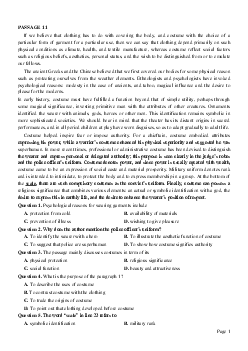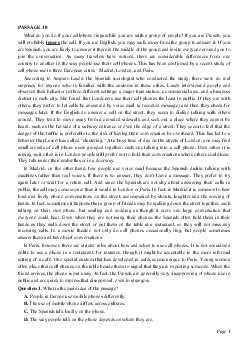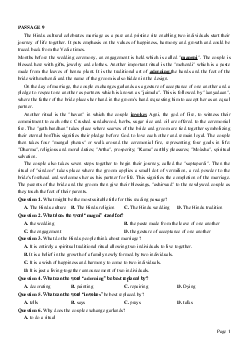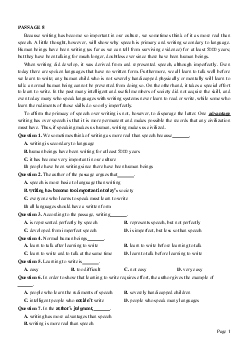

Preview text:
PASSAGE 5
In ancient Greece athletic festivals were very important and had strong religious associations. The
Olympic athletic festival, held every four years in honour of Zeus, eventually lost its local character,
became first a national event, and then, after the rules against foreign competitors had been abolished,
international. No one knows exactly how far back the Olympic Games go, but some official records date
from 776 B.C. The Games took place in August on the plain by Mount Olympus. Many thousands of
spectators gathered from all parts of Greece, but no married woman was admitted even as a spectator.
Slaves, women and dishonoured people were not allowed to compete. Records show that the evening of
the third day was devoted to sacrificial offerings to the heroes of the day, and the fourth day, that of the
full moon, was set aside as a holy day. On the sixth and last day all the victors were crowned with holy
garlands of wild olive from a sacred wood. So great was the honour that the winner of the foot race gave
his name to the year of his victory. How their results compared with modern standards, we unfortunately
had no means of telling. After an uninterrupted history of almost 1,200 years, the Games were abolished
in A. D. 394 because of their pagan origin. It was a great many years before there was another such
international athletic gathering. The Greek institution was brought back into existence in 1896 and the
first small meeting took place in Athens. After the 1908 London Olympics, success was re-established
and nations sent their best representatives.
Today, the Games are held in different countries in turn. The Olympics start with the arrival in the
stadium of a torch, lighted on Mount Olympus by the sun’s rays. It is carried by a succession of runners
to the stadium. The torch symbolizes the continuation of the ancient Greek athletic ideals, and it burns
throughout the Games until the closing ceremony.
Question 1. The first Olympic Games took place
A. in the 17th century A.D
B. certainly before 700 B.C
C. over three thousand years
D. a thousand years ago
Question 2. At the ancient Olympic Games, any competitor had to be A. Greek B. male C. unmarried
D. neither a slave not a foreign
Question 3. The word “that” in line 5 (2nd paragraph) refers to A. the third day B. the fourth day C. the evening D. a holy day
Question 4. During the Games, on the evening before the moon was full,
A. sheep and cattle were sacrificed to Zeus
B. all the victors were crowned with garlands
C. olive branches were gathered from a sacred wood
D. the heroes were honoured with sacrificed offerings
Question 5. Modern athlete’s results cannot be compared with those of the ancient runners because
A. details such as times were not recorded in the past
B. the Greeks had no means of telling the time
C. modem athletes are much better
D. official records were lost soon after the Games were abolished Page 1
Question 6. The word “pagan” (3rd paragraph) is closest in meaning to A. Greek B. Olympic C. religious D. sporty
Question 7. The continuity of the Olympic Games
A. was broken in the year A.D 1200 B. was broken in 1896
C. was interrupted for over 1,500 years
D. was interrupted for almost 1,200 years
Question 8. The phrase “in turn” in line 1 (the last paragraph) can best be replaced by A. in a sequence B. by chance C. in order D. in time
Question 9. The word “succession” in line 3 (the last paragraph) is closest in meaning to A. procession B. a number C. process D. marching
Question 10. The modern Olympics compared with the ancient ones are
A. inspired by the same ideals
B. more restricted in the variety of events
C. different in every respect
D. too much concerned with international rivalry ĐÁP ÁN 1-B 2-B 3-C 4-D 5-A 6-C 7-C 8-C 9-C 10-A
LỜI GIẢI CHI TIẾT Question 1:
B: thông tin trong câu: . No one knows exactly how far back the Olympic Games go, but some official records date from 776 B.C. Question 2:
thông tin trong câu: Slaves, women and dishonoured people were not allowed to compete Question 4:
D:’ the evening before the moon was full’ là ‘the evening of the third day’-> heroes was honoured with sacrificed offerings Question 7:
C: Thông tin trong câu: the Games were abolished in A. D. 394 because of their pagan origin. The Greek
institution was brought back into existence in 1896 and the first small meeting took place in Athens. (1896-394= 1504) Question 10:
thông tin trong câu: The torch symbolizes the continuation of the ancient Greek athletic ideals, and it
burns throughout the Games until the closing ceremony Page 2




